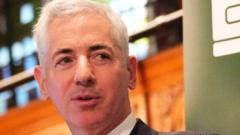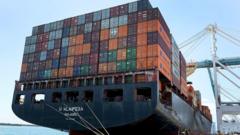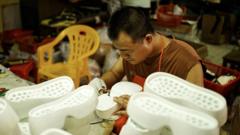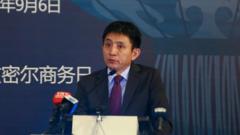Bill Ackman, a billionaire hedge fund manager, calls for a pause on tariffs to recalibrate trade relations, cautioning that the economic consequences could be dire if not addressed promptly.
**Billionaire Investor Sounds Alarm on Trump's Trade Tariffs Amidst Financial Turmoil**

**Billionaire Investor Sounds Alarm on Trump's Trade Tariffs Amidst Financial Turmoil**
A prominent supporter of Donald Trump warns that the recently instituted tariffs could plunge the economy into a severe recession.
---
In a stark warning about the potential repercussions of President Donald Trump's newly implemented trade tariffs, billionaire hedge fund manager Bill Ackman has urged the administration to reconsider its approach. During a period marked by significant market instability, Ackman asserted that failure to halt the tariff measures could lead to what he termed an "economic nuclear winter."
In a post shared on social media, Ackman urged Trump to allow three months for nations to renegotiate their trading agreements with the United States. His concerns were echoed by Jamie Dimon, chairman of JPMorgan Chase, who noted the heightened risk of inflation and rising consumer prices triggered by the tariffs.
Despite the warnings from these business titans, Trump has vocally defended his tariff strategy, suggesting that sometimes "you have to take medicine to fix something." The President has expressed confidence that these measures will generate new jobs and attract investments in the American economy.
Nevertheless, the immediate aftermath has seen stock prices fall sharply in global markets, including Europe and Asia. Investors reacted to Trump's announcement of a 10% baseline tariff on imports, with higher rates reaching 50% imposed on several countries, many of which are crucial manufacturing hubs.
Ackman, originally an advocate for the Democratic Party before switching support to Trump in July 2024, highlighted that the sweeping nature of the tariffs failed to distinguish between friendly nations and adversarial ones. He characterized the tariffs as "massive and disproportionate," suggesting they may jeopardize the investor confidence crucial to the U.S. economy.
As international retaliation looms—most notably from China, which has already announced its own tariffs on U.S. goods—Ackman emphasized the opportunity for Trump to initiate a "90-day time out" to negotiate fairer trade agreements and stimulate investment in America.
Meanwhile, Dimon added to the discourse by warning that the longer the tariff issues remain unresolved, the more detrimental the cumulative effects will be on the economy. He described a looming risk of recession as increasing in likelihood, urging for swift resolution to avert long-term consequences.
In parallel, Trump and his administration have downplayed recession fears, asserting that negotiations with European and Asian countries are underway, suggesting that a resolution is on the horizon.
However, the trajectory of the markets and the responses from global economies remain uncertain as tariff measures come into effect this week.
In a stark warning about the potential repercussions of President Donald Trump's newly implemented trade tariffs, billionaire hedge fund manager Bill Ackman has urged the administration to reconsider its approach. During a period marked by significant market instability, Ackman asserted that failure to halt the tariff measures could lead to what he termed an "economic nuclear winter."
In a post shared on social media, Ackman urged Trump to allow three months for nations to renegotiate their trading agreements with the United States. His concerns were echoed by Jamie Dimon, chairman of JPMorgan Chase, who noted the heightened risk of inflation and rising consumer prices triggered by the tariffs.
Despite the warnings from these business titans, Trump has vocally defended his tariff strategy, suggesting that sometimes "you have to take medicine to fix something." The President has expressed confidence that these measures will generate new jobs and attract investments in the American economy.
Nevertheless, the immediate aftermath has seen stock prices fall sharply in global markets, including Europe and Asia. Investors reacted to Trump's announcement of a 10% baseline tariff on imports, with higher rates reaching 50% imposed on several countries, many of which are crucial manufacturing hubs.
Ackman, originally an advocate for the Democratic Party before switching support to Trump in July 2024, highlighted that the sweeping nature of the tariffs failed to distinguish between friendly nations and adversarial ones. He characterized the tariffs as "massive and disproportionate," suggesting they may jeopardize the investor confidence crucial to the U.S. economy.
As international retaliation looms—most notably from China, which has already announced its own tariffs on U.S. goods—Ackman emphasized the opportunity for Trump to initiate a "90-day time out" to negotiate fairer trade agreements and stimulate investment in America.
Meanwhile, Dimon added to the discourse by warning that the longer the tariff issues remain unresolved, the more detrimental the cumulative effects will be on the economy. He described a looming risk of recession as increasing in likelihood, urging for swift resolution to avert long-term consequences.
In parallel, Trump and his administration have downplayed recession fears, asserting that negotiations with European and Asian countries are underway, suggesting that a resolution is on the horizon.
However, the trajectory of the markets and the responses from global economies remain uncertain as tariff measures come into effect this week.






















